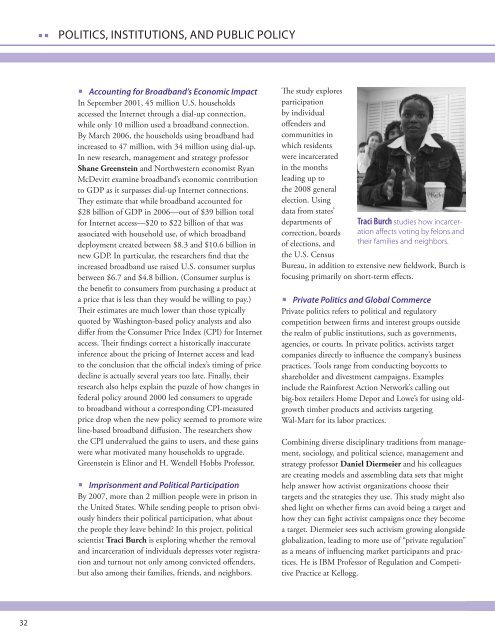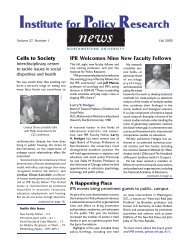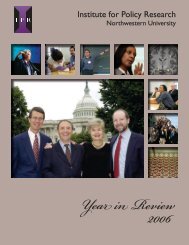IPR - Institute for Policy Research - Northwestern University
IPR - Institute for Policy Research - Northwestern University
IPR - Institute for Policy Research - Northwestern University
Create successful ePaper yourself
Turn your PDF publications into a flip-book with our unique Google optimized e-Paper software.
Politics, Institutions, and Public <strong>Policy</strong><br />
< Accounting <strong>for</strong> Broadband’s Economic Impact<br />
In September 2001, 45 million U.S. households<br />
accessed the Internet through a dial-up connection,<br />
while only 10 million used a broadband connection.<br />
By March 2006, the households using broadband had<br />
increased to 47 million, with 34 million using dial-up.<br />
In new research, management and strategy professor<br />
Shane Greenstein and <strong>Northwestern</strong> economist Ryan<br />
McDevitt examine broadband’s economic contribution<br />
to GDP as it surpasses dial-up Internet connections.<br />
They estimate that while broadband accounted <strong>for</strong><br />
$28 billion of GDP in 2006—out of $39 billion total<br />
<strong>for</strong> Internet access—$20 to $22 billion of that was<br />
associated with household use, of which broadband<br />
deployment created between $8.3 and $10.6 billion in<br />
new GDP. In particular, the researchers find that the<br />
increased broadband use raised U.S. consumer surplus<br />
between $6.7 and $4.8 billion. (Consumer surplus is<br />
the benefit to consumers from purchasing a product at<br />
a price that is less than they would be willing to pay.)<br />
Their estimates are much lower than those typically<br />
quoted by Washington-based policy analysts and also<br />
differ from the Consumer Price Index (CPI) <strong>for</strong> Internet<br />
access. Their findings correct a historically inaccurate<br />
inference about the pricing of Internet access and lead<br />
to the conclusion that the official index’s timing of price<br />
decline is actually several years too late. Finally, their<br />
research also helps explain the puzzle of how changes in<br />
federal policy around 2000 led consumers to upgrade<br />
to broadband without a corresponding CPI-measured<br />
price drop when the new policy seemed to promote wire<br />
line-based broadband diffusion. The researchers show<br />
the CPI undervalued the gains to users, and these gains<br />
were what motivated many households to upgrade.<br />
Greenstein is Elinor and H. Wendell Hobbs Professor.<br />
< Imprisonment and Political Participation<br />
By 2007, more than 2 million people were in prison in<br />
the United States. While sending people to prison obviously<br />
hinders their political participation, what about<br />
the people they leave behind? In this project, political<br />
scientist Traci Burch is exploring whether the removal<br />
and incarceration of individuals depresses voter registration<br />
and turnout not only among convicted offenders,<br />
but also among their families, friends, and neighbors.<br />
The study explores<br />
participation<br />
by individual<br />
offenders and<br />
communities in<br />
which residents<br />
were incarcerated<br />
in the months<br />
leading up to<br />
the 2008 general<br />
election. Using<br />
data from states’<br />
departments of<br />
correction, boards<br />
of elections, and<br />
the U.S. Census<br />
Traci Burch studies how incarceration<br />
affects voting by felons and<br />
their families and neighbors.<br />
Bureau, in addition to extensive new fieldwork, Burch is<br />
focusing primarily on short-term effects.<br />
< Private Politics and Global Commerce<br />
Private politics refers to political and regulatory<br />
competition between firms and interest groups outside<br />
the realm of public institutions, such as governments,<br />
agencies, or courts. In private politics, activists target<br />
companies directly to influence the company’s business<br />
practices. Tools range from conducting boycotts to<br />
shareholder and divestment campaigns. Examples<br />
include the Rain<strong>for</strong>est Action Network’s calling out<br />
big-box retailers Home Depot and Lowe’s <strong>for</strong> using oldgrowth<br />
timber products and activists targeting<br />
Wal-Mart <strong>for</strong> its labor practices.<br />
Combining diverse disciplinary traditions from management,<br />
sociology, and political science, management and<br />
strategy professor Daniel Diermeier and his colleagues<br />
are creating models and assembling data sets that might<br />
help answer how activist organizations choose their<br />
targets and the strategies they use. This study might also<br />
shed light on whether firms can avoid being a target and<br />
how they can fight activist campaigns once they become<br />
a target. Diermeier sees such activism growing alongside<br />
globalization, leading to more use of “private regulation”<br />
as a means of influencing market participants and practices.<br />
He is IBM Professor of Regulation and Competitive<br />
Practice at Kellogg.<br />
32
















